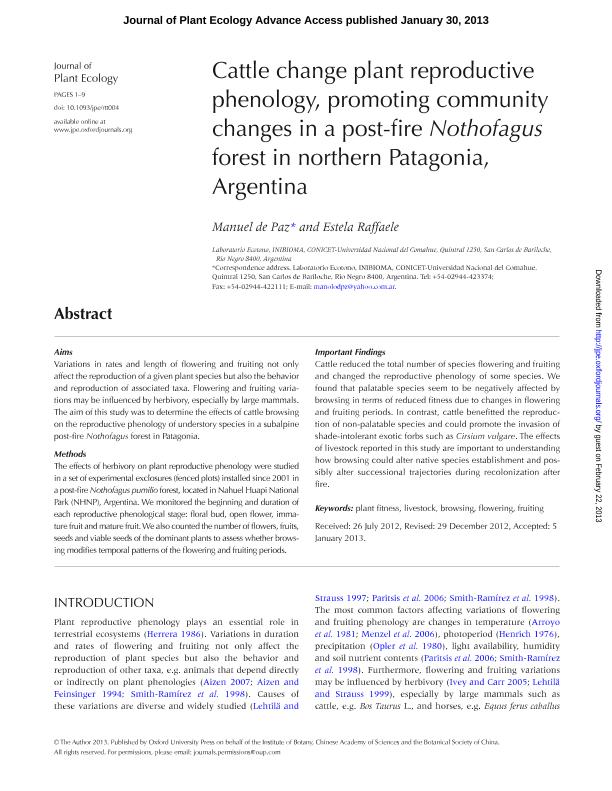Artículo
Cattle change plant reproductive phenology, promoting community changes in a post-fire Nothofagus forest in northern Patagonia, Argentina
Fecha de publicación:
02/2013
Editorial:
Oxford University Press
Revista:
Journal Of Plant Ecology-uk
ISSN:
1752-9921
Idioma:
Inglés
Tipo de recurso:
Artículo publicado
Clasificación temática:
Resumen
Aims Variations in rates and length of flowering and fruiting not only affect the reproduction of a given plant species but also the behavior and reproduction of associated taxa. Flowering and fruiting variations may be influenced by herbivory, especially by large mammals. The aim of this study was to determine the effects of cattle browsing on the reproductive phenology of understory species in a subalpine post-fire Nothofagus forest in Patagonia.
Methods The effects of herbivory on plant reproductive phenology were studied in a set of experimental exclosures (fenced plots) installed since 2001 in a post-fire N. pumilio forest, located in Nahuel Huapi National Park (NHNP), Argentina. We monitored the beginning and duration of each reproductive phenological stage: floral bud, open flower, immature fruit and mature fruit. We also counted the number of flowers, fruits, seeds and viable seeds of the dominant plants to assess whether browsing modifies temporal patterns of the flowering and fruiting periods.
Important Findings Cattle reduced the total number of species flowering and fruiting and changed the reproductive phenology of some species. We found that palatable species seem to be negatively affected by browsing in terms of reduced fitness due to changes in flowering and fruiting periods. In contrast, cattle benefitted the reproduction of non-palatable species and could promote the invasion of shade-intolerant exotic forbs such as Cirsium vulgare. The effects of livestock reported in this study are important to understanding how browsing could alter native species establishment and possibly alter successional trajectories during recolonization after fire.
Palabras clave:
Plant Fitness
,
Livestock
,
Flowering
,
Fruiting
Archivos asociados
Licencia
Identificadores
Colecciones
Articulos(INIBIOMA)
Articulos de INST. DE INVEST.EN BIODIVERSIDAD Y MEDIOAMBIENTE
Articulos de INST. DE INVEST.EN BIODIVERSIDAD Y MEDIOAMBIENTE
Citación
de Paz, Manuel; Raffaele, Estela; Cattle change plant reproductive phenology, promoting community changes in a post-fire Nothofagus forest in northern Patagonia, Argentina; Oxford University Press; Journal Of Plant Ecology-uk; 6; 6; 2-2013; 459-467
Compartir
Altmétricas




